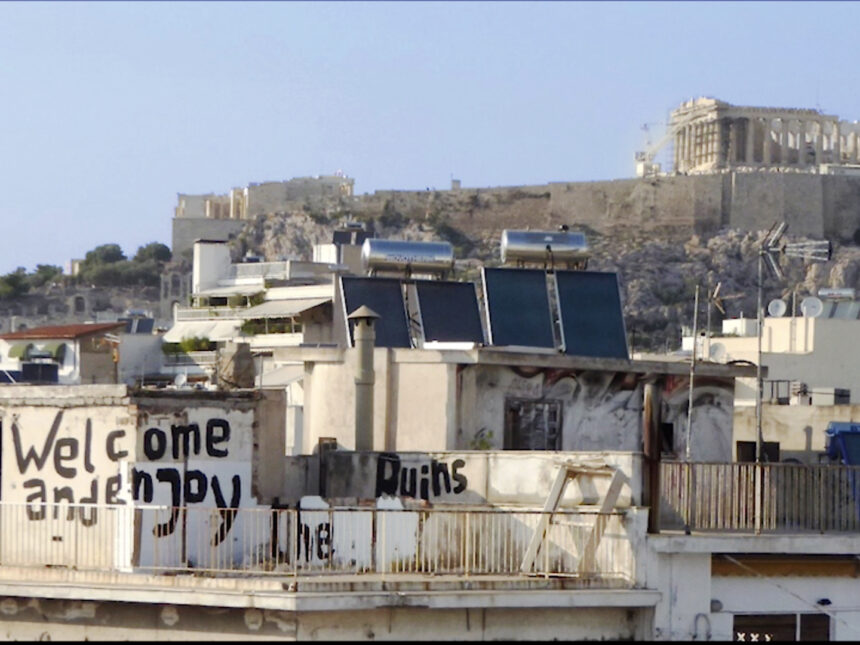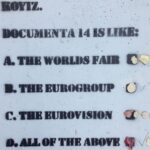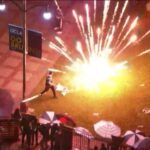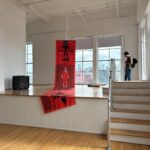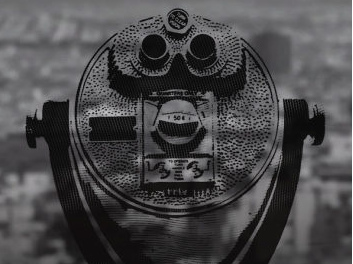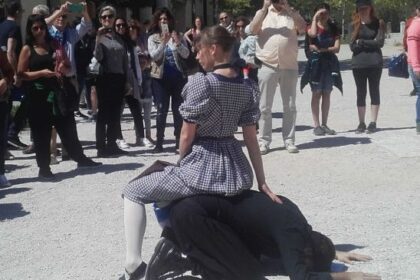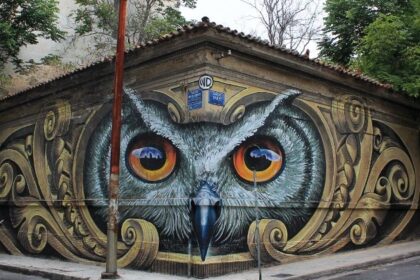Undocumented documentations _on lessons, narratives and copyrights
Eva Giannakopoulou & Dimitra Kondylatou
Our collaborative video essay “Undocumented documentations _on narratives, lessons and copyrights” [1] is the outcome of our mutual theoretical and visual concerns within the context of the “Learning from documenta” project. As visual artists and long-standing collaborators engaged in research and critical theory, we have produced videos, experimental documentaries, films and time-based works related to social issues and their political impact. The LfD project offered us the opportunity to collectively reflect upon the theoretical discontinuities produced by documenta 14’s working title “Learning from Athens” [2], and the polarized opinions and reactions it had generated in Athens’ art scene. As active members of this scene, we felt obliged to position ourselves in relation to such a predicament and to contribute to this project with our artistic input.


Participating in the project seemed to be an interesting opportunity for us to further cultivate our artistic practice that encompassed fieldwork, participatory observation and archival research. Other significant stimulants for joining were the multiplicity of the methodological and analytical tools it offered, and the anthropological and art-based practice in combination with approaches to institutional critique proposed by the LfD project. All these elements provided us with a motivating framework for exploration and experimentation with such practices that were already present in our works.

From the very beginning of our project, we engaged with lens-based practices by documenting “The Parliament of Bodies” [3], several exhibitions of documenta 14 in Athens, parallel events such as the opening of the sixth Athens Biennale “Waiting for the Barbarians”, the intense meetings and workshops of the LfD group, as well as the activities of the “Athens Arts Observatory” [4]. Soon we had dense and multifaceted archival material at our disposal. It not only consisted of documentations of major cultural events taking place in Athens between October 2016 and June 2017 but also included a collection of data derived from relevant press covering, citations and critiques. Throughout the documentation stage, we had to consider our documentation tactics and decide upon our filming strategies, with regards to our subjects of observation and the visual result we were aiming to achieve out of this massive amount of material. We focused our initial concerns on finding the methodological tools that would enable us to produce an aesthetically provocative narrative at the intersection of art and anthropology.



The resulting video draws from observational cinema techniques and attempts to interpret – either through poetic or pragmatic connotations – the explicit or ambiguous dimensions of the theoretical, curatorial and artistic expressions we came across during our research. As we filmed in multiple time frames and spaces, our coexistence in this mutual process established a visual dialogue between the two of us. We combined improvisation and interaction by using hand-held cameras. The use of long shots enabled us to capture the atmosphere of the events, their public and their spatial dimensions. Our extensive use of close-ups on body parts documents the non-verbal, echoing some of documenta’s own conceptual and curatorial interests. Mirroring is a central motif in our video, conveyed by filming the reflections either of our research subjects and objects, or of our own into each other’s camera, thereby commenting on the mirroring nature of the relationship between “Learning from Athens” and “Learning from documenta.” Because of our attempt to prioritize immediateness during our documentation of multiple parallel events, the recording media and the resulting image quality vary. Our choices of subjects and techniques allowed us not only to provide a general view of a large-scale exhibition, but also to focus on significant critical details that would reveal the theoretical and hierarchical dimension of this artistic megastructure.



Our individual perspectives, which would produce interesting coincidence when our filming focus recorded from slightly different angles were brought together, prompted us to make a double channel video. The dialogical potential offered by this format was amplified by our use of montage. Since for professional reasons we had to work apart, we adopted a fragmented editing process through an online correspondence. A systematic digital exchange of edited parts triggered each other’s video responses and informed the making of the final piece. At the last stage, we assembled the resulting parts by visual associations or conceptual links and synchronized them into a narrative that was structured around four main themes.


The video begins with the reception of documenta 14 in Athens by local institutions and political figures, and its representation in the press and the media. It unravels the political interpretations and the discourses developed around documenta 14 within art institutions and in public spaces. It questions how cultural policies are embedded in international art events and what tools and formats facilitate their delivery. Its final part consists of stylistically divergent materials, which introduce the issue of copyright and authorship. For reasons that will be explained below, we replaced our footage with material found online under a Creative Commons license, and we then incorporated our indirect shots of artworks and performances [5], further distorting them into abstract forms.


The LfD team’s anthropological analysis of issues raised by the discourse and the program of documenta 14 highlighted many aspects that informed our filmmaking and editing decisions and appear in both the form and the content of our work. However, while certain concepts and tools are shared by art and anthropology, they can often be used differently, acquire distinct meanings, and lead to disparate results. During our fieldwork and the creation process, we were confronted with political, theoretical, methodological, epistemological, and moral issues. The uses of recorded material from the team’s public events, the uses of camera, the ways an artist should approach the subjects of her research, and visual interpretations of theoretical discourse, all caused major debates within the team and made us realize the differentiation of methods and practices in different disciplines. As artists and at the same time members of a multidisciplinary and multi-subjective collective, we had to reflect on, comply with, or respond to certain codes of ethics that are not always aligned in these fields. Such controversies often generated not only conflicts but also fruitful discussions within the team around questions that were central to the project.


Similar issues concerned us after the opening of the exhibition. In order to comply with both documenta 14 and the exhibiting artists’ prerequisites on copyright, we attempted to enter a dialogue with documenta 14’s Greek press and media department to ask for permission to film. Their vague reply reached us only three days before the official closing date of the exhibition in Athens. In that sense, it essentially equaled a negative response. When still expecting an official response, we went ahead with our recordings in order to stay on track with our research. This situation prompted us to reflect on the complications of intellectual property rights which, to a large extent, intervene, contradict or coincide with essential aspects of an artwork that is meant to be open to interpretation or use. We wondered whether a public performance can be reproduced through documentation, and, if so, whether the documentation is a performance or a reproduction. After consulting copyright lawyers, investigating the legislation and revising our material, we came up with tactics of image manipulation (such as those mentioned above) that would allow us to use our original material on fair terms.



The copyright issue is entangled in the relationship of art and politics with institutions and other power structures and has repercussions for artistic creation. documenta 14’s last announcement before closing its doors in Kassel, that “it is not owned by anyone in particular” [6], came as a surprise that resonated strangely with us. After all, apart from being time-consuming, the experience of making this work, with all its complications, had also affected us emotionally and intellectually, as individuals and as a working collective. Through documenta 14’s ambiguous statement re-emerged not only issues on intellectual property rights, but also contradictions in meaning that have concerned us throughout the LfD project. “Undocumented documentations _on narratives, lessons and copyright” is the outcome of cross-disciplinary negotiations stemming from, and generating, disciplined and undisciplined artistic tactics and methodologies. The aftermath of our work evolves, as this text is coming to its end.

Link to the video: https://vimeo.com/347084771
Eva Giannakopoulou grew up in Ithaca, Greece and she is currently living and working in Athens. In the past she has lived in Naples, Barcelona, Istanbul, Berlin and in other places depending on the circumstances. She has presented performances at various unconventional sites, including beaches, squares, rivers, parks, and impromptu stages in public spaces. Her work has been exhibited at museums, institutions, galleries, and festivals, including: the ONASSIS-STEGI Foundation (FUTURE N.O.W Festival, 2021) the Benaki Museum (“The Same River Twice”, 2019; “The Equilibrists”, 2016, both curated and organized by the New Museum, New York and the DESTE Foundation), Goethe-Institut Athen (“Weasel Dance”, 2019), the Athens Biennale AB6: ANTI (2018), the Athens Biennale AB5to6: OMONOIA (2016), the Material Art Fair (Mexico City, 2017), the Rosa Luxemburg Foundation (Berlin, “Autonomy Help ME!”, solo exhibition, 2015), MPA-B (Berlin, 2014 and 2015), Action Field Kodra (Thessaloniki, 2012), and the National Bank of Greece Cultural Foundation (MIET) Thessaloniki Center (at a parallel event of the third Thessaloniki Biennale of Contemporary Art, 2011).She has co-curated and co-organized numerous art projects and performative events. In 2013-2014, she was a co-labourer of the MPA-B (Month of Performance Art, Berlin). In 2019 she co-founds “Most Mechanics Are Crooks”, an artistic and curatorial band that aims to reclaim insincerity as a tool of progressive discourse.
Dimitra Kondylatou is a visual artist living in Athens. She works across video-making, editing, writing and hosting. She is interested in the limits of art and its entanglements with tourism and everyday life. She visually explores gestures, practices and correspondences within contexts and spaces of hospitality and exchange. Her methodology is informed by and crosses boundaries with other disciplines, such as anthropology, through her participation in collective projects (“Learning from documenta”, 2015-2017; “About food”, 2016-2017), and the presentation of her work in conferences and publications (kyklàda.press 2020; Kunstlicht vol. 39, 2019, Fonés, 2016). From 2012 to 2018 her artistic research on art and tourism was enriched through her seasonal occupation as manager and worker of neion guesthouse in Lefkada, and through the residential project “The island-resignified” that she initiated and hosted there from 2015 to 2017. She is a member of kyklàda.press publications (2020-). She was a member of TWIXTlab (2017-2018). She graduated from the Dutch Art Institute (2017) and the Athens School of Fine Arts (2012). In 2019 she received the ARTRWORKS fellowship from Stavros Niarchos Foundation. Her artistic activity since 2008 includes workshops (“Alternate Paths”, Syros International Film Festival 2020; “Dishmapping”, Athens School of Fine Arts, 2019) and group exhibitions (“Weasel Dance”, Goethe Institut Athen, 2019; “Ideology Meets Implementation”, W139, 2017).
[1] Video essay, double-channel video, dimensions variable, duration: 14:43 min, presented in the closing event of the Learning from Documenta project, National Technical University of Athens, Greece, 2017.
[2] Abbreviation for the “Learning from Documenta” project.
[3] The public programs of documenta 14, active from September 2016 until April 2017 in Athens, and until September 2017 in Kassel.
[4] The “Learning from Documenta” platform of public events and discussions.
[5] Filmed either through another device or as a background to something else.

